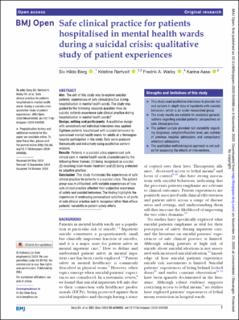Safe clinical practice for patients hospitalised in mental health wards during a suicidal crisis: qualitative study of patient experiences
Peer reviewed, Journal article
Published version
Permanent lenke
https://hdl.handle.net/11250/2724744Utgivelsesdato
2020-10Metadata
Vis full innførselSamlinger
Originalversjon
Berg SH, Rørtveit K, Walby FA, et al. (2020) Safe clinical practice for patients hospitalised in mental health wards during a suicidal crisis: qualitative study of patient experiences. BMJ Open;10:e040088. doi:10.1136/ bmjopen-2020-040088 10.1136/bmjopen-2020-040088Sammendrag
Aim: The aim of this study was to explore suicidal patients' experiences of safe clinical practice during hospitalisation in mental health wards. The study was guided by the following research question: How do suicidal patients experience safe clinical practice during hospitalisation in mental health wards?
Design, setting and participants: A qualitative design with semistructured individual interviews was applied. Eighteen patients hospitalised with suicidal behaviour in specialised mental health wards for adults at a Norwegian hospital participated in the study. Data were analysed thematically and inductively using qualitative content analysis.
Results: Patients in a suicidal crisis experienced safe clinical care in mental health wards characterised by the following three themes: (1) being recognised as suicidal, (2) receiving tailor-made treatment and (3) being protected by adaptive practice.
Conclusion: This study illuminates the experiences of safe clinical practice for patients in a suicidal crisis. The patient group was multifaceted, with variable experiences of how safe clinical practice affected their subjective experience of safety and suicidal behaviour. The finding highlights the importance of embracing personalised activities in all parts of safe clinical practice and to recognise rather than efface patients' variability in patient safety efforts.

